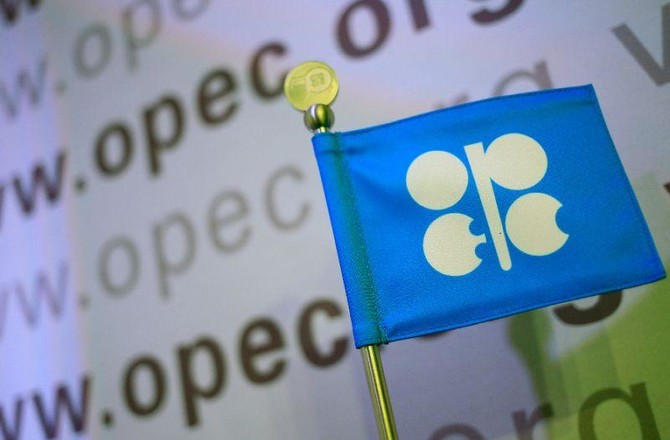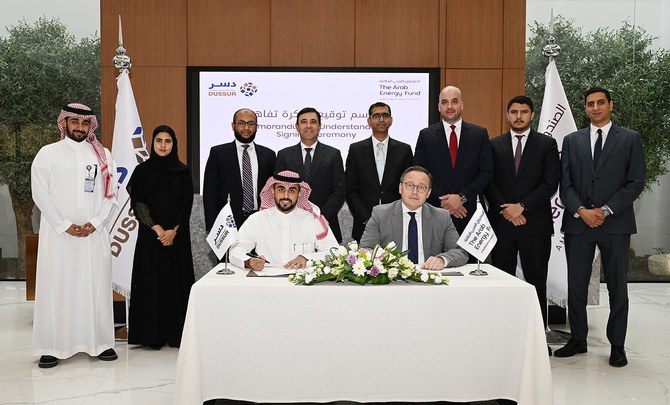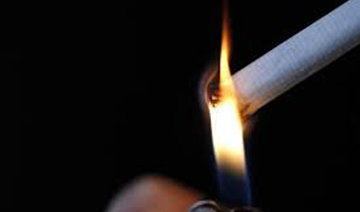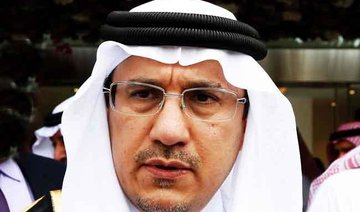DUBAI: The Middle East economy is expected to grow by 2.4 percent in 2018, after modest contraction this year, and would further expand at a faster 4 percent in 2019, a report from accountancy and finance body ICAEW said.
The economic outlook is however weighed by a possible extension of OPEC’s output cut deal, which ends on March 2018, and could further dent the public finances of the region’s major oil producers that belong to the group, ICAEW said.
“Governments across the region are unlikely to find any solace in the oil market, which looks likely to require an extension of OPEC’s production cut deal merely to stabilize prices around $45-50. In this case governments would come under further pressure to prioritize public spending in growth-enhancing areas and find new revenue sources in order to stop public debt from accelerating,” the report, produced in partnership with Oxford Economics, noted.
The Gulf Cooperation Council’s decision to implement value-added tax (VAT), as one way to generate non-oil revenue, by January 1, 2018 could dim the Middle East economic horizon as it translates to higher cost of living in households affected by the new levy.
“Together with the impact of a weaker dollar on import costs, these pressures are expected to drive consumer price inflation at the GCC level from just 1.2 percent in 2017 to 4.7 percent in 2018, and 3.5 percent in 2019,” the report said.
The IMF however said the introduction of VAT across the GCC would boost the region’s GDP by about 1.5 percent. The UAE on Sunday implemented a federal tax on tobacco products and energy and fizzy drinks, following Saudi Arabia’s lead which introduced excise taxes on the same items earlier this year.
“GCC countries need to shift focus toward deeper, multi-dimensional fiscal policy and institutional reforms. These will help to secure long-term fiscal sustainability, and also support the development of vibrant private sectors,” Tom Rogers, ICAEW Economic Adviser and Associate Director of Oxford Economics, said.
“Furthermore, by boosting investor and market confidence, they can also start a virtuous cycle of stronger investments, including FDI, and output growth in the near term.”
The report also mentioned that while Oman is benefiting from trade diversion, due to the trade blockade against Qatar by Gulf neighbors, the windfall would be modest and temporary “and does little to address the more fundamental challenges the economy faces.”
“Oman’s government has not been as aggressive in cutting expenditure recently as other GCC economies, and as a result the squeeze on spending is having to last longer,” the report said.
“Getting the deficit under control soon in Oman is critical, and if the OPEC deal needs to be extended beyond 2018 Q1 this will require yet more difficult policy choices to be made by the Omani government in order to achieve financial stability,” Michael Armstrong, FCA and ICAEW Regional Director for the Middle East, Africa and South Asia, said.
Middle East GDP to grow by 2.4 percent in 2018, but outlook weighed by OPEC oil deal
Middle East GDP to grow by 2.4 percent in 2018, but outlook weighed by OPEC oil deal

Closing Bell: Saudi main index edges down to close at 12,198

RIYADH: Saudi Arabia’s Tadawul All Share Index slipped on Sunday losing 0.06 points to close at 12,198.38.
The total trading turnover of the benchmark index was SR4.42 billion ($1.18 billion) as 60 stocks advanced, while 160 retreated.
On the other hand, Nomu, the parallel market, rose 577.98 points, or 2.18 percent, to close at 27,062.01. This comes as 28 stocks advanced while as many as 33 retreated.
Meanwhile, the MSCI Tadawul Index slipped 1.45 points, or 0.09 percent, to close at 1,528.60.
The best-performing stock of the day was Lazurde Co. for Jewelry. The company’s share price surged 10.00 percent to SR16.06.
Other top performers included Middle East Specialized Cables Co. as well as Aldrees Petroleum and Transport Services Co.
The worst performer was Zahrat Al Waha for Trading Co., whose share price dropped by 10 percent to SR45.45.
Makkah Construction and Development Co. as well as Jazan Development and Investment Co also performed poorly.
On the announcements front, Kingdom Holding Co. announced its interim financial results for the period ending March 31.
According to a Tadawul statement, the company’s net profit hit SR196 million in the first quarter of 2024, reflecting a 14.6 percent surge when compared to the similar quarter last year.
The increase is mainly due to a rise in the sale of investment property, a surge in the share of results from equity-accounted investees, and a decrease in financial charges.
It is also linked to an increase in finance income as well as a drop in withholding and income tax.
Moreover, Dar Alarkan Real Estate Development Co. announced its interim financial results for the first three months of 2024.
A bourse filing revealed that the firm’s net profit reached SR153.5 million by the period ending March 31, up 30.57 percent from the corresponding period in 2023. This surge is primarily attributed to higher property sales.
Furthermore, Middle East Paper Co. announced its interim financial results for the year’s first quarter.
According to a Tadawul statement, the company recorded a net loss of SR18 million in the first three months of 2024, compared to a net loss of SR7 million in the same period of the previous year.
This is mainly owed to reduced gross profit, a jump in general and administrative dues, and increased finance and zakat expenses.
Red Sea International Co. also announced its interim financial results for the period ending on March 31.
A bourse filing revealed that the firm’s net profit stood at SR13.3 million at the end of the first quarter of 2024, compared to a net loss of SR19.5 million recorded in the same quarter a year ago.
This is mainly the result of the strategic business transformation, which included acquiring 51 percent of First Fix and effectively executing and delivering projects.
Meanwhile, Saudi Manpower Solutions Co., announced the completion of the institutional book-building process and the determination of the final offer price for its initial public offering on the main market of the Saudi Exchange.
According to a company statement, the final offer price has been set at SR7.5 per share, with a market capitalization of SR3 billion at listing. The price range for the offering was set at SR7 to SR7.5.
The institutional book-building process generated an order book of around SR115 billion and was 128 times oversubscribed, indicating strong investor demand.
Baheej unveils waterfront development project in Yanbu

RIYADH: Saudi Arabia’s tourism sector continues to expand, with Baheej Tourism Development Co. unveiling a new waterfront development project in Yanbu.
This joint venture between ASFAR, a Saudi tourism investment company owned by the Public Investment Fund, and the Tamimi-AWN Alliance, aims to develop the waterfront area of the Royal Commission at Yanbu.
The initial project will cover 32,000 sq. m. and feature three leisure assets: a beach, a tourist activation center, and a hotel. It is set for complete unveiling in 2027.
A fourth component is scheduled to be announced at a later date.
According to a release, each aspect of the project aims to provide memorable and sustainable tourism experiences.
Visitors will soon have the opportunity to explore Yanbu, a city with a rich history dating back to the 16th century, renowned for its architectural heritage and sandy beaches.
Baheej envisions Yanbu as an iconic location that showcases Saudi Arabia’s culture, history, and natural beauty, providing a unique destination to tourists.
Nora Al-Tamimi, CEO of Baheej, outlines the project’s development in three phases, emphasizing community engagement, sustainability, and minimal environmental impact.
Al-Tamimi said: “We believe that destinations are not just built but discovered, and Baheej’s commitment lies in uncovering Saudi Arabia’s hidden gems. Our strategic collaborations are aimed at curating unparalleled experiences that showcase Saudi Arabia’s rich culture, history, and natural wonders.”
She added: “Yanbu City’s contemporary infrastructure, captivating environment, and attractive coastal landscapes make it an exceptional gateway to the Red Sea Riviera. We anticipate the complete unveiling of our destination and its components by the end of 2027.”
By analyzing risks and investment opportunities, the project aims to position Yanbu as a locally and internationally sought-after tourist destination, explained Al-Tamimi.
Baheej’s role will involve integrating local culture and promoting protection of the planet, enhancing Yanbu’s appeal and supporting regional development.
This approach aims to transform Yanbu’s hospitality sector, blending community heritage with environmental stewardship.
Established in 2023, Baheej aims to create accessible tourism experiences that meet international standards while remaining contextual and sustainable.
These initiatives are part of a broader strategy to transform Saudi towns into thriving, eco-friendly destinations.
Baheej also plans to announce additional projects in other cities by the end of 2024.
Saudi banks’ money supply surges 8% in March to reach $753bn

RIYADH: Saudi banks’ money supply rose 8 percent in March, as compared to the same month last year, to reach SR2.82 trillion ($753 billion), official data showed.
According to the data released by the Saudi Central Bank, also known as SAMA, the increase was mainly fueled by a roughly 21 percent surge in banks’ term and savings accounts, reaching SR843.25 billion. These deposits represented the second-largest portion, comprising 30 percent of the total money supply, following demand deposits, which constituted 50 percent at SR1.41 trillion.
On the other hand, quasi-money holdings made up 21 percent of the total, experiencing a 1 percent decrease during this period. Meanwhile, currency outside banks accounted for an 8 percent share, showing a 10 percent growth.
Multiple factors influenced the upsurge in term deposits. Firstly, the elevated interest rate environment within the Kingdom, shaped by the US Federal Reserve’s anti-inflationary monetary policy, has spurred individuals and entities to seek higher returns through these accounts.
Moreover, the increase in accounts held by government-related entities played a significant role. As per Fitch Ratings, these entities opted to channel their surplus liquidity into term deposits with commercial banks, thereby boosting the growth trajectory of such accounts.
It is noteworthy that during 2022, SAMA raised key policy rates seven times, followed by an additional four increases in 2023. The central bank’s repo rate was last raised by 25 basis points to 6 percent in its July 2023 meeting, marking its highest level since 2001. Since then, rates have remained unchanged.
Meanwhile, US inflation surged to a six-month high in March, prompting investors to delay their expectations for Federal Reserve rate cuts.
Deposits represent a costly funding source for banks, with heightened competition in the financial market significantly driving up their average cost.
Despite this, the surge in interest rates also strengthened Saudi banks’ profits on the asset side. Higher borrowing rates led to increased income, offsetting the challenges posed by the expensive funding environment.
On the asset side, Saudi bank loans grew by 11 percent during this period to reach SR2.67 trillion; therefore, lending growth among Saudi banks outpaced deposits.
In their April report, S&P Global suggested that Saudi financial institutions would explore alternative funding strategies to manage the rapid increase in lending, driven by rising demand for new mortgages.
The credit-rating agency noted that the funding profiles of financial institutions in the Kingdom will undergo changes, mainly due to a government-supported initiative aimed at boosting homeownership.
According to their analysis, mortgage financing accounted for 23.5 percent of Saudi banks’ total credit allocation by the end of 2023, compared to 12.8 percent in 2019.
They highlighted that the ongoing financing needs of the Vision 2030 economic initiative, coupled with relatively sluggish deposit growth, are likely to prompt banks to seek alternative budget sources, including external funding.
S&P Global anticipated this trend to persist, especially as corporate lending assumes a more significant role in growth in the coming years.
The report indicated that Saudi banks are expected to adopt alternative funding strategies to support this expansion. It also noted that the stability of Saudi deposits mitigates the risk posed by maturity mismatch.
Furthermore, the agency projected an increase in Saudi banks’ foreign liabilities, rising from approximately $19.2 billion by the end of 2023, to meet the funding demands of robust lending growth, particularly amidst slower deposit expansion.
The report emphasized that Saudi banks have already tapped into international capital markets, and S&P Global anticipates this trend to continue over the next three to five years.
Saudi aviation sector contributes $21bn to GDP: GACA

RIYADH: Saudi Arabia is experiencing steady growth in its aviation sector, contributing $21 billion to the Kingdom’s gross domestic product in 2023 and solidifying its position as a global tourism hub.
The General Authority for Civil Aviation stated that the aviation industry is creating positive impacts in other key areas of Saudi Arabia’s economy, with the sector responsible for a further $32.2 billion in tourism receipts, according to a press statement.
GACA added that the aviation industry alone has enabled 241,000 jobs in the Kingdom and has contributed to supporting 717,000 jobs in tourism-related areas.
The authority revealed that the nation outperformed global aviation sector growth rates in 2023, achieving 123 percent of international pre-pandemic seat capacity compared with a worldwide and regional average recovery rate of 90 percent and 95 percent, respectively.
GACA will present these findings in an analysis titled “2024 State of Aviation Report” at the Future Aviation Forum on May 20.
Saudi Arabia’s Minister of Transport and Logistics Services and Chairman of GACA, Saleh Al-Jasser, said: “The Saudi aviation sector is providing unprecedented opportunities for global aviation, achieving major leaps in global rankings in support of Vision 2030 and in line with the National Strategy for Transport and Logistics services.”
Saudi Arabia’s National Transport and Logistics Strategy seeks to increase the industry’s contribution to the Kingdom’s GDP to 10 percent from the current 6 percent by 2030.
“The inaugural State of Aviation report highlights the contribution that the aviation sector makes to the Saudi society and economy, with the great support from the Custodian of the Two Holy Mosques and His Highness the Crown Prince,” added Al-Jasser.
Abdulaziz Al-Duailej, president of GACA, said that the Kingdom is building a more resilient, connected, high-performing aviation sector across various verticals, including airlines, airports, cargo and logistics, and human capability and training systems.
“GACA has developed this report to fulfill its role as a strategic aviation regulator, measuring and recording the progress of the sector in line with the targets of the Saudi Aviation Strategy. The report also informs GACA’s ongoing regulatory work and the impacts of new regulations in creating greater competition, value, and choice in Saudi Aviation,” said Al-Duailej.
During the Future Aviation Forum, Saudi Arabia is expected to unveil a roadmap detailing how the Kingdom will grow its aviation sector tenfold into a $2 billion industry by 2030.
This year’s gathering will bring together more than 5,000 sector experts and leaders from more than 100 countries to discuss ways to shape the future of international air travel and freight management.
The Arab Energy Fund and Dussur sign $200m MoU to boost greenfield energy projects

RIYADH: Greenfield energy projects are set to receive a boost, as The Arab Energy Fund has signed a $200 million funding agreement with the Saudi Arabian Industrial Investments Co.
A memorandum of understanding was executed between the energy-focused financial institution TAEF and the Saudi-based industrial investment and development company, also known as Dussur.
This deal aims to fast-track and facilitate prospective financing opportunities for TAEF through bridge financing in selected greenfield projects promoted by Dussur.
Nicolas Thevenot, chief banking officer at TAEF, said: “We are thrilled to sign this MoU with Dussur and enter an era of collaboration to support the advancement of the flourishing energy sector in Saudi Arabia.”
He added: “Our strategic partnership with Dussur is also aligned with our planned investment of up to $1 billion to advancing the energy transition with a focus on decarbonization and related technologies over the next five years.”
The MoU contributes to the Kingdom’s efforts to advance industrialization and economic diversification by defining a broad framework agreement between TAEF and Dussur.
“Dussur is pleased to have signed this MoU with TAEF, which could unveil multiple collaborative opportunities to maximize Dussur’s impact on the Saudi economy,” said Omar Al-Qarawi, director of finance and accounting at Dussur.
He added: “Through this MoU, Dussur and TAEF aim to further their joint efforts to leverage strategic and sustainable industrial investments.”
In February, the Public Investment Fund-backed Dussur launched an oilfield services and industrial chemicals factory in Jubail in collaboration with Bakers Hughes, a Texas-based oilfield services provider.
The Saudi Petrolite Chemicals facility is expected to increase the Kingdom’s supply base of raw materials such as solvents and glycols.
It is intended to accelerate the development of the skills and capabilities of Saudi human resources in manufacturing, thus contributing to the increase in localization rates and the rapid delivery of chemical solutions.
The opening ceremony was attended by Saudi Energy Minister Prince Abdulaziz bin Salman, Investment Minister Khalid Al-Falih, and Minister of Industry and Mineral Resources Bandar Alkhorayef.















